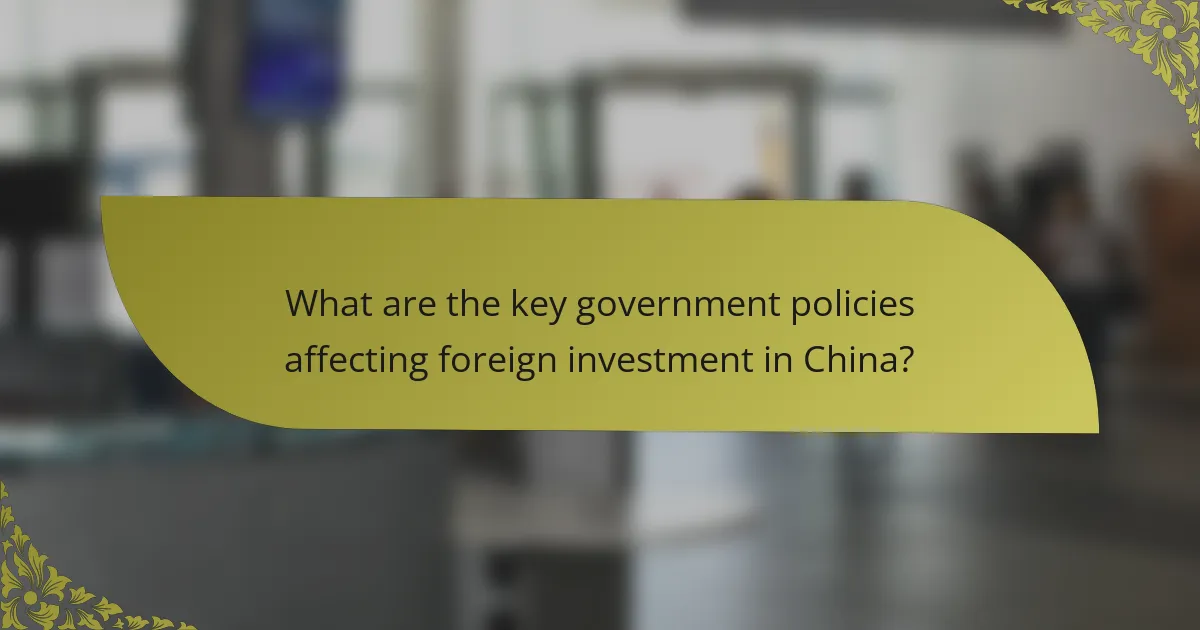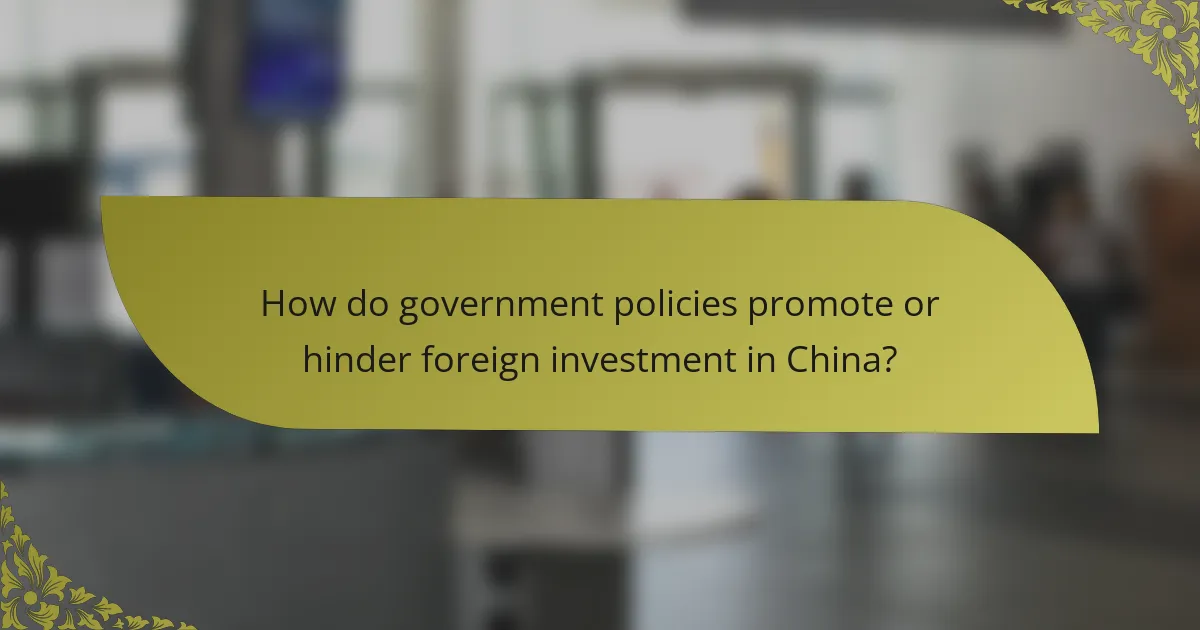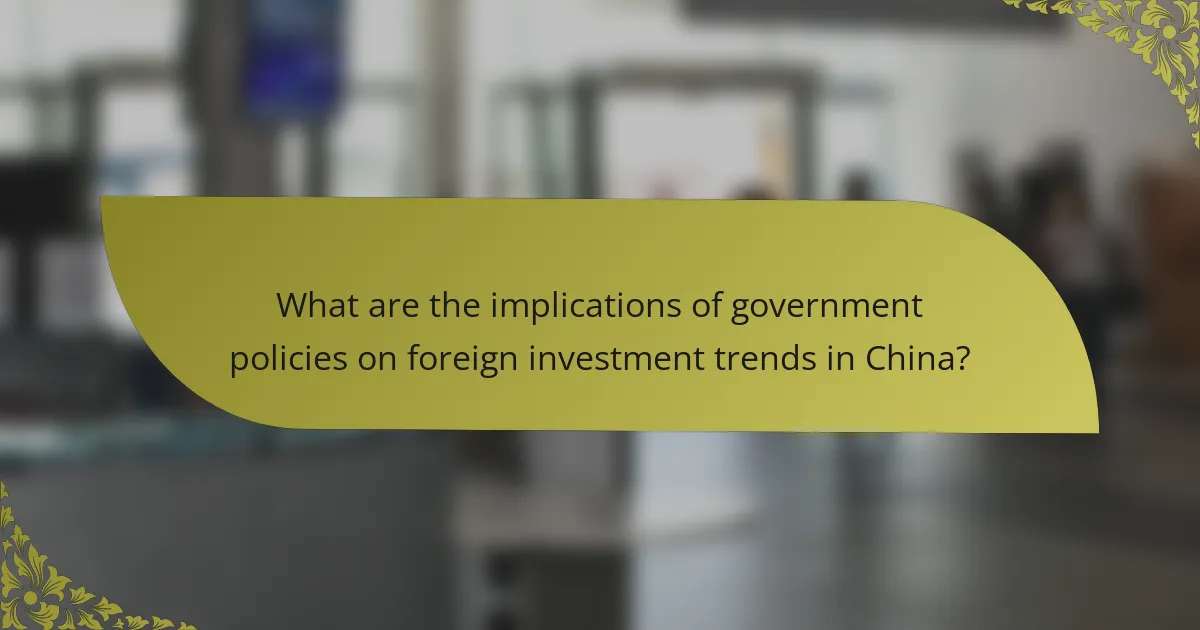The article examines the impact of government policies on foreign investment in China, focusing on key regulations such as the Foreign Investment Law, the Negative List, and Special Administrative Measures. The Foreign Investment Law, enacted in 2020, aims to foster a transparent and equitable environment for foreign investors by ensuring equal treatment of domestic and foreign enterprises. The Negative List outlines sectors with restrictions on foreign investment, while Special Administrative Measures apply to specific regions, allowing for more flexible investment conditions. The article discusses how these policies can both promote foreign investment through incentives and protections, as well as pose challenges through regulatory hurdles and sector-specific restrictions. Overall, it highlights the dual role of Chinese government policies in shaping the foreign investment landscape.

What are the key government policies affecting foreign investment in China?
Key government policies affecting foreign investment in China include the Foreign Investment Law, the Negative List, and the Special Administrative Measures. The Foreign Investment Law, enacted in 2020, aims to create a more transparent and fair environment for foreign investors. It emphasizes equal treatment of domestic and foreign enterprises. The Negative List specifies sectors where foreign investment is restricted or prohibited. This list is updated regularly to reflect changes in policy. Additionally, Special Administrative Measures apply to specific regions, such as Free Trade Zones, allowing for more relaxed investment regulations. These policies collectively shape the landscape for foreign investment in China.
How do these policies influence foreign investor decisions?
Government policies significantly influence foreign investor decisions. These policies shape the regulatory environment, impacting investment security and profitability. For instance, favorable tax incentives can attract foreign capital. Conversely, restrictive regulations may deter investment.
According to a report by the World Bank, countries with transparent policies see higher foreign direct investment (FDI). In China, policies promoting free trade zones have led to increased foreign investment. Additionally, government stability and policy consistency are crucial for investor confidence.
A study by the Asian Development Bank highlights that clear legal frameworks enhance foreign investor trust. Thus, government policies directly affect the flow of foreign investment in China.
What specific regulations are in place for foreign investment?
Foreign investment in China is governed by several specific regulations. The Foreign Investment Law, effective from January 1, 2020, serves as the primary legal framework. This law aims to create a more transparent and fair environment for foreign investors. It replaces previous laws and consolidates various regulations.
The law emphasizes equal treatment for foreign and domestic enterprises. It prohibits forced technology transfers and protects intellectual property rights. Investment projects may require approval from relevant authorities, depending on their nature and scale.
Additionally, foreign investors must adhere to the Negative List, which outlines sectors where foreign investment is restricted or prohibited. This list is updated regularly to reflect policy changes. Local regulations may also impose additional requirements on foreign investments.
Overall, these regulations are designed to enhance the investment climate while safeguarding national interests.
How do tax incentives impact foreign investment in China?
Tax incentives significantly enhance foreign investment in China. They reduce the overall cost of doing business for foreign companies. This encourages more firms to enter the Chinese market. For example, the Chinese government offers reduced corporate income tax rates to foreign enterprises. In some cases, these rates can be as low as 15%, compared to the standard 25%. Additionally, tax holidays and exemptions on certain goods are common. These incentives attract industries such as technology and manufacturing. According to the Ministry of Commerce, foreign direct investment (FDI) in China reached $163 billion in 2020, partly due to favorable tax policies. Overall, tax incentives play a crucial role in shaping the foreign investment landscape in China.
What historical context is important for understanding these policies?
The historical context important for understanding these policies includes China’s economic reforms initiated in 1978. These reforms transitioned China from a centrally planned economy to a more market-oriented one. The Open Door Policy was established to attract foreign investment and technology. This policy marked the beginning of significant foreign direct investment inflows. Additionally, China’s entry into the World Trade Organization in 2001 further integrated its economy with global markets. This integration led to increased foreign participation in various sectors. Understanding these historical milestones is crucial for analyzing the evolution of China’s foreign investment policies.
How have government policies evolved over the past decades?
Government policies in China have evolved significantly over the past decades. In the 1980s, China began implementing economic reforms and opening its markets to foreign investment. Policies such as the establishment of Special Economic Zones (SEZs) attracted foreign capital and technology.
During the 1990s, China further liberalized its economy, joining the World Trade Organization in 2001. This accession led to a surge in foreign direct investment (FDI) as China committed to reducing trade barriers.
In the 2000s, the focus shifted to enhancing regulatory frameworks and protecting intellectual property rights. Recent policies emphasize sustainable development and innovation, aligning with global standards.
The Belt and Road Initiative, launched in 2013, reflects a strategic approach to expand foreign investments beyond China. Overall, these evolving policies demonstrate a transition from isolation to active global engagement, significantly impacting foreign investment in China.
What major events have shaped foreign investment regulations in China?
Several major events have shaped foreign investment regulations in China. The Open Door Policy initiated in 1978 marked the beginning of foreign investment in China. This policy allowed foreign companies to invest and establish joint ventures. The establishment of Special Economic Zones (SEZs) in cities like Shenzhen in 1980 further encouraged foreign investment. These zones offered tax incentives and less stringent regulations.
China’s accession to the World Trade Organization (WTO) in 2001 was another pivotal moment. This event led to significant reforms in investment regulations, aligning them with international standards. The Foreign Investment Law implemented in 2020 consolidated previous regulations. It aimed to create a more transparent and predictable environment for foreign investors.
These events collectively transformed China’s approach to foreign investment, making it more open and competitive. Each step reflected a broader strategy to integrate China into the global economy.

How do government policies promote or hinder foreign investment in China?
Government policies in China both promote and hinder foreign investment. The Chinese government promotes foreign investment through favorable policies such as tax incentives and streamlined approval processes. For example, the Foreign Investment Law, implemented in 2020, aims to create a more transparent and fair business environment. It encourages foreign companies by offering better protection for intellectual property rights.
Conversely, some policies can hinder foreign investment. Restrictions on certain sectors limit where foreign companies can operate. Additionally, regulatory challenges and bureaucratic hurdles can complicate the investment process. For instance, industries deemed sensitive may face stricter scrutiny and limitations.
Overall, while China’s government policies can create opportunities for foreign investors, they also impose barriers that can deter investment in certain areas.
What are the benefits of favorable government policies for foreign investors?
Favorable government policies for foreign investors create a conducive environment for investment. These policies often include tax incentives, streamlined regulations, and protection of intellectual property rights. Such measures reduce operational costs and risks for foreign businesses. For instance, China has implemented Free Trade Zones that offer reduced tariffs and simplified customs procedures. This attracts more foreign direct investment (FDI), boosting economic growth. According to the World Bank, countries with favorable investment climates see higher FDI inflows, which can lead to job creation and technological advancement. Therefore, favorable government policies significantly enhance the appeal of a country for foreign investors.
How do these benefits enhance the investment landscape?
Government policies that promote foreign investment create a more attractive investment landscape. These benefits include tax incentives, streamlined regulations, and improved infrastructure. Tax incentives reduce the overall cost of investment for foreign entities. Streamlined regulations simplify the process of entering the market. Improved infrastructure enhances operational efficiency for businesses. According to a report by the World Bank, countries with favorable investment policies see a 30% increase in foreign direct investment. This influx of capital drives economic growth and job creation. Consequently, a positive investment landscape fosters innovation and competitiveness in the market.
What specific sectors are most positively impacted?
The specific sectors most positively impacted by government policies on foreign investment in China are technology, renewable energy, and healthcare. The technology sector benefits from favorable regulations and incentives for innovation. In 2020, foreign investments in technology reached approximately $20 billion. Renewable energy has seen significant growth due to government support for green initiatives. In 2021, China became the world’s largest market for renewable energy investments, totaling over $100 billion. The healthcare sector is positively influenced by policies aimed at improving public health and expanding access to medical services. Recent investments in healthcare exceeded $15 billion, driven by policy reforms promoting foreign participation.
What challenges do foreign investors face due to restrictive policies?
Foreign investors face several challenges due to restrictive policies in China. These policies often include stringent regulations on foreign ownership. For instance, many sectors require joint ventures with local firms. This can limit operational control for foreign investors. Additionally, bureaucratic hurdles can delay project approvals. High compliance costs further strain foreign investment efforts. Restrictions on capital repatriation can hinder profit transfers. Moreover, local competition may benefit from government support. These challenges create a complex environment for foreign investors aiming to enter the Chinese market.
How do bureaucratic hurdles affect foreign investment?
Bureaucratic hurdles significantly hinder foreign investment. These obstacles include complex regulations, lengthy approval processes, and inconsistent enforcement. Investors face challenges in navigating local laws and requirements. As a result, potential investors may delay or abandon their plans. According to the World Bank, countries with streamlined processes attract more foreign direct investment. In China, excessive bureaucracy can deter businesses from entering the market. This leads to lost economic opportunities and reduced competitiveness. Ultimately, bureaucratic inefficiencies can diminish the overall appeal of a country for foreign investors.
What role does intellectual property protection play in investment decisions?
Intellectual property protection significantly influences investment decisions. Strong IP protection encourages investors by safeguarding their innovations and reducing the risk of theft. This security leads to increased confidence in potential returns. Investors are more likely to commit resources when they know their intellectual assets are protected. For example, a study by the World Bank shows that countries with robust IP laws attract higher levels of foreign direct investment. In China, the enforcement of IP rights has improved, making it a more attractive destination for foreign investors. This trend highlights the critical role of IP protection in shaping investment landscapes.

What are the implications of government policies on foreign investment trends in China?
Government policies in China significantly influence foreign investment trends. Regulations can either encourage or deter foreign capital inflow. For instance, the 2020 Foreign Investment Law aimed to create a more transparent environment. This law enhances protections for foreign investors and reduces bureaucratic hurdles. As a result, foreign direct investment (FDI) increased by 6.2% in 2020, despite global economic downturns. Conversely, restrictive measures, such as trade tariffs, can lead to decreased investment. The ongoing U.S.-China trade tensions exemplify this impact. Overall, government policies are crucial in shaping the landscape for foreign investment in China.
How do these policies affect the flow of foreign direct investment (FDI)?
Government policies significantly influence the flow of foreign direct investment (FDI) in China. Policies that promote investment, such as tax incentives and streamlined regulations, attract more foreign investors. Conversely, restrictive policies can deter investment by increasing operational costs and uncertainty. For example, the introduction of the Foreign Investment Law in 2020 aimed to create a more transparent environment, boosting FDI inflows. In 2021, China reported a 20% increase in FDI, largely attributed to favorable government measures. Additionally, sectors prioritized by the government receive more investment, indicating policy direction’s direct impact on FDI patterns.
What trends have emerged in FDI as a result of recent policy changes?
Recent policy changes in China have led to increased foreign direct investment (FDI). One trend is the relaxation of restrictions on foreign ownership in various sectors. This has attracted more multinational companies seeking to invest in the Chinese market. Another trend is the emphasis on technology transfer and innovation. Policies now encourage foreign firms to collaborate with local companies. Additionally, there is a shift towards more transparent regulatory frameworks. This transparency builds investor confidence and enhances the investment climate. Furthermore, there is a growing focus on green investments. The Chinese government is incentivizing sustainable practices among foreign investors. These trends indicate a more open and dynamic FDI landscape in China.
How do foreign investor perceptions shift with policy updates?
Foreign investor perceptions shift significantly with policy updates. Changes in regulations can create uncertainty or confidence among investors. For example, the introduction of favorable tax policies can enhance investor sentiment. Conversely, stricter regulations may lead to concerns about market access. Research indicates that transparency in policy communication positively influences investor trust. Additionally, historical data shows that countries with stable policies attract more foreign direct investment. In China, recent policies promoting innovation have attracted increased foreign interest. Therefore, the nature of policy updates directly impacts how foreign investors view the market.
What future developments can be anticipated in government policies regarding foreign investment?
Future developments in government policies regarding foreign investment in China may include increased regulatory scrutiny and enhanced transparency measures. The Chinese government is likely to implement stricter compliance requirements for foreign investors. This trend follows recent efforts to protect national security and promote local industry. Additionally, policies may shift towards incentivizing foreign investment in high-tech sectors. Reports indicate that China aims to attract foreign capital in areas like green technology and digital economy. Furthermore, bilateral investment treaties may be negotiated to facilitate smoother foreign investment processes. These potential changes reflect China’s evolving economic strategy and commitment to modernization.
How might international relations influence these policies?
International relations significantly influence government policies regarding foreign investment in China. Diplomatic ties can lead to favorable policy adjustments that attract foreign investors. For instance, strong relationships with Western nations often result in more open trade agreements. Conversely, strained relations may prompt China to impose stricter regulations on foreign investments. Historical events, such as trade wars, illustrate how international tensions can alter investment landscapes. In 2018, the U.S.-China trade conflict led to increased tariffs, impacting foreign investment decisions. Thus, the dynamics of international relations directly shape the policies that govern foreign investment in China.
What potential reforms are being discussed to enhance foreign investment?
Potential reforms to enhance foreign investment in China include the simplification of regulatory procedures. Streamlining the approval process can attract more foreign capital. Another reform is the reduction of restrictions on foreign ownership in certain sectors. This change can make the market more accessible. Additionally, improving intellectual property protection is under discussion. Stronger protections can build investor confidence. Lastly, enhancing transparency in regulatory practices is crucial. Clear and consistent regulations can foster a more favorable investment climate. These discussions are ongoing among policymakers and stakeholders in the investment community.
What best practices should foreign investors consider when navigating government policies in China?
Foreign investors should conduct thorough research on China’s regulatory environment. Understanding local laws and regulations is crucial. Engaging with local legal experts can provide valuable insights. Establishing relationships with government officials can facilitate smoother navigation of policies. Monitoring changes in policy is essential, as regulations can evolve rapidly. Participating in industry associations can offer networking opportunities and information sharing. Utilizing government resources, such as investment promotion agencies, can provide guidance. Finally, maintaining compliance with all local laws is vital to avoid penalties and ensure successful investment.
The main entity of this article is government policies affecting foreign investment in China. The article provides an overview of key regulations, including the Foreign Investment Law, the Negative List, and Special Administrative Measures, which collectively shape the investment landscape. It discusses how these policies influence foreign investor decisions, the impact of tax incentives, and the historical context of foreign investment regulations in China. Additionally, the article highlights challenges faced by foreign investors due to restrictive policies and bureaucratic hurdles, while also addressing emerging trends and potential future developments in investment policies.



